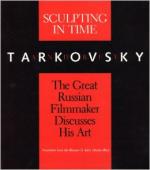
|
| Name: _________________________ | Period: ___________________ |
This test consists of 5 multiple choice questions, 5 short answer questions, and 10 short essay questions.
Multiple Choice Questions
1. Tarkovsky claims to be against structuralist attempts to look at a _________ as a sign of something else.
(a) Plot.
(b) Rain.
(c) Frame.
(d) Character.
2. What artist, born in the 1360s, is considered to be the greatest medieval Russian painter of Orthodox icons and frescoes?
(a) Andrey Rublev.
(b) Effendi Kapiyev.
(c) Kenji Mizoguchi.
(d) Alexander Blok.
3. What Latin term does Tarkovsky use to refer to the role of the director as a representative of the masses?
(a) Mons populii.
(b) Vox populii.
(c) Magnum vox.
(d) Vox magnum.
4. Tarkovsky claims in Chapter IX that he got the idea for The Sacrifice long before what film?
(a) The Killer.
(b) Nostalgia.
(c) Ivan's Childhood.
(d) Stalker.
5. Who played the title role in the film, Stalker?
(a) Alexander Kaidanovsky.
(b) Effendi Kapiyev.
(c) Alexander Blok.
(d) Kenji Mizoguchi.
Short Answer Questions
1. In order to be what, does Tarkovsky write, "you simply have to be so, without asking permission of anybody"?
2. Tarkovsky claims in Chapter VI that all art is by nature, what?
3. What filming technique did Tarkovsky implement more in The Sacrifice than in any of his other films?
4. Where was The Sacrifice filmed?
5. Which role did Larisa Tarkovskaya play in the film, The Mirror?
Short Essay Questions
1. What is the journey of the protagonist in The Sacrifice? How is Tarkovsky's life reflected in the film?
2. How does Tarkovsky describe the stresses of filming on The Sacrifice?
3. What is the all-powerful factor of film to Tarkovsky? Why?
4. What does Tarkovsky define "commercializing" as in Chapter VII? What is the filmmaker's duty in this regard?
5. What does Tarkovsky mean by "immediate" art forms in Chapter VII?
6. Due to the state that cinema is in, what struggles does the artist face as filmmaker? What does Tarkovsky suggest he focus on?
7. How is success measured, according to Tarkovsky?
8. How is the artist "at odds with society," as Tarkovsky states in Chapter VII?
9. Describe Tarkovsky's film, Nostalgia. Where and when was it filmed?
10. What does Tarkovsky write of "heroes" in Chapter VIII?
|
This section contains 914 words (approx. 4 pages at 300 words per page) |

|




